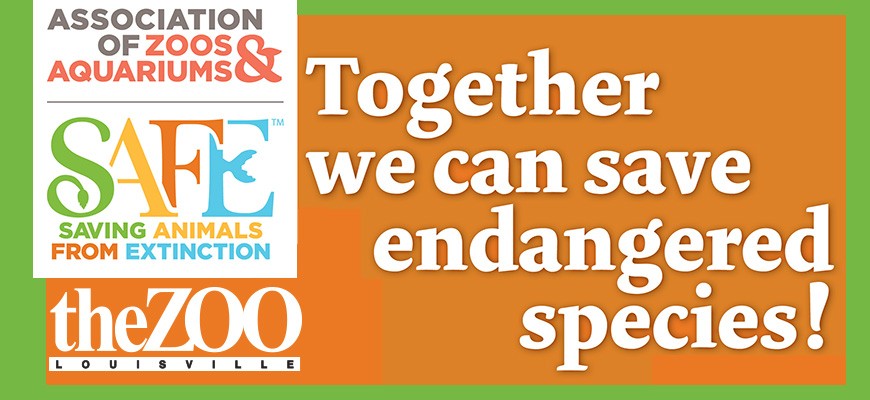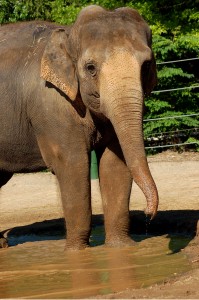ENDANGERED SPECIES “VANISHING” AT LOUISVILLE ZOO
The “vanishing” animals are part of a national effort to highlight the growing extinction crisis
Louisville, KY – May 15, 2015 – Today is the 10th Anniversary of Endangered Species Day, and to highlight the growing importance of working to save endangered species from extinction, The Louisville Zoo will have docents on hand Saturday, May 16, for interpretation at the sites of two of the animals that have been highlighted for the day — Asian elephant and western lowland gorilla.
“If there were no more Asian elephants or western lowland gorillas left on our planet it would be an awful situation to find ourselves in,” Zoo Director John Walczak said. “Thankfully, we are not in that situation and in fact, we are in a position to do something about it. That is why today, we are asking our visitors to pause and consider what extinction looks and feels like in a collaborative effort to motivate and inspire them to join the Louisville Zoo and other accredited zoos and aquariums in our efforts to save animals from extinction.”
The day is part of a larger national effort organized by the Association of Zoos & Aquariums, of which the Louisville Zoo is a member. Specifically, the 229 accredited members of the AZA are coming together in a variety of ways to help the public consider what it would be like to not be able to see, learn from or connect with these incredible animals again. This is to raise awareness of the efforts to save animals from extinction and to help launch AZA SAFE: Saving Animals From Extinction (SAFE).
For decades, AZA-accredited zoos and aquariums have been leaders in species survival and are already working to restore more than 30 species to healthy wild populations, including the American bison, the California condor and a variety of aquatic species.
Through SAFE, AZA-accredited zoos and aquariums will convene scientists and stakeholders globally to identify the factors threatening species, develop Conservation Action Plans, collect new resources and engage the public.
In 2015, SAFE will focus on 10 species and then add an additional 10 species each year for the next 10 years. The inaugural 10 species include: African penguin, Asian elephant, black rhinoceros, cheetah, gorilla, sea turtles, vaquita, sharks and rays, western pond turtle and whooping crane.
“AZA conservationists have identified more than 100 species facing the greatest threats and where accredited zoos and aquariums have unique conservation and science knowledge to contribute,” AZA President and CEO Jim Maddy said. “Today, we’re demonstrating just how profound the loss would be if we don’t take action now to protect wildlife. More importantly, we are also explaining to the public just what AZA-accredited zoos and aquariums are doing to save animals from extinction.”
The Louisville Zoo is involved with conservation efforts including Polar Bears International, International Elephant Foundation and the Black-Footed Ferret Recovery Program.
Public Asked to Help Save Animals from Extinction
One of the easiest conservation actions the public can take is to visit Louisville Zoo. Doing so directly supports the collaborative efforts of hundreds of researchers, field conservationists and scientists from AZA-accredited zoos and aquariums working to save animals from extinction.
For more information, visit louisvillezoo.org and follow the online conversation May 15 via #savingspecies.
The Louisville Zoo, a non-profit organization and state zoo of Kentucky, is dedicated to bettering the bond between people and our planet by providing excellent care for animals, a great experience for visitors, and leadership in scientific research and conservation education. The Zoo is accredited by the American Alliance of Museums (AAM) and by the Association of Zoos and Aquariums (AZA).
About AZA SAFE: Saving Animals From Extinction
AZA SAFE: Saving Animals From Extinction combines the power of zoo & aquarium visitors with the resources and collective expertise of zoos and aquariums accredited by the Association of Zoos & Aquariums and partners to save animals from extinction. Together we are working on saving the most vulnerable wildlife species from extinction and protecting them for future generations. To learn more, visit https://www.aza.org/aza-safe


